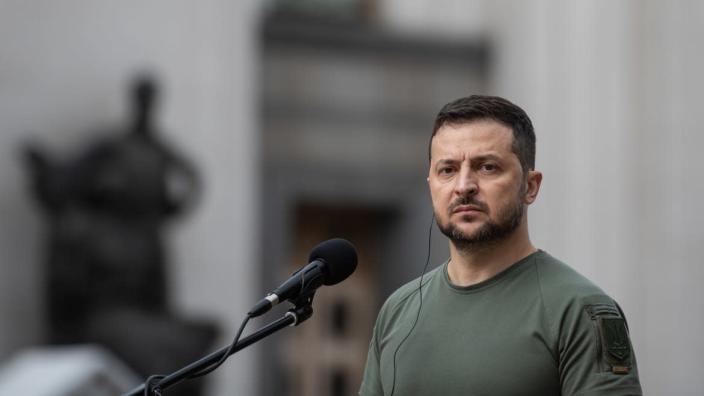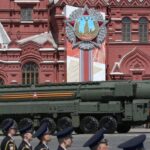
A group of Ukrainian officials, ministers, and former prime ministers have been gathering behind closed doors for months, working to come up with ways to stop Russian President Vladimir Putin from attacking Ukraine ever again.
And as of Tuesday, they think they’ve got the solution.
Ukraine wants to create a coalition of countries that are willing to guarantee Ukraine’s security against any future breach of its territory or encroachment on its sovereignty, Ukrainian President Volodymyr Zelensky’s office announced Tuesday.
In a new document, finalized on Tuesday, the officials describe the plan as a way to galvanize a group of countries willing to back up Ukraine with legally binding guarantees that they will come to Ukraine’s aid to help deter another attack from Russia—or any other country for that matter—and to help Ukraine prepare to forcefully respond.
The plan doesn’t necessarily include troop commitments or promises, like a North Atlantic Treaty Organization Article 5 kind of commitment, but it would include long-term investments in Ukraine’s defense industrial base, weapons transfers, and intelligence support. The plan also expresses interest in anti-aircraft and anti-missile defense equipment.
But there’s one problem. Allies and the United States—as has historically been the case with Ukraine—might not be in a position to sign onto a legally binding treaty that includes security “guarantees” that could rope the United States into broader conflict.
The plan is just the latest step Ukrainian officials are taking to try to right past wrongs from an earlier security agreement with other countries, including the United States, that some Ukrainian officials believe hasn’t been honored since Russia invaded Ukraine. As part of an agreement to relinquish its nuclear weapons, Ukraine signed on to an accord with the United States, the U.K., and Russia in the 1990s in which the United States promised security “assurances” to Ukraine in case its borders were breached. But those assurances, known as the Budapest Memorandum, weren’t enough to deter Russia from invading in 2014 and 2022, and Ukrainian officials have indicated they think the United States hasn’t fulfilled its promises.
A U.S. Translation Flop Is Fueling a Messy Row Over Putin’s War
“The Budapest Memorandum on Security Assurances proved worthless,” the new plan states. “Unless Ukraine is provided with unique and effective security guarantees—embedded in an eventual peace process—there is no reason to believe that this will not happen again.”
There’s no certainty that the United States is interested in going all in now with security “guarantees.” When asked about signing onto a plan like the one presented today, a State Department spokesperson only acknowledged its existence.
“We are aware of this recommendation and continue to engage with our Allies and partners on ways to support Ukraine’s fight against Russia’s unwarranted invasion,” the spokesperson said. “The United States continues to provide security assistance to Ukraine during its ongoing conflict with Russia.”
American resistance to security guarantees is a hurdle that Ukrainian officials have been facing for decades. Just as they want to obtain “guarantees” now, Ukrainian officials wanted security pledges in the Budapest Memorandum, diplomatic negotiators told The Daily Beast. But the United States—even without the immediate threat of an ongoing Russian war in Ukraine—was hesitant to sign on to guarantees, Ukraine’s Permanent Representative to the European Council, who was involved in negotiating the Budapest Memorandum, told The Daily Beast.
“From the very beginning, we were insisting on having national security guarantees as legally binding document. And the version we had prepared and which was handed over to our American colleagues was exactly in the form of legally binding document—a treaty,” the permanent representative, Borys Tarasyuk, told The Daily Beast in an exclusive interview. “Unfortunately, since the very beginning… the United States and Russia were reluctant to talk about a legally binding document.”
Other negotiators, including Rose Gottemoeller, the former U.S. under secretary of state for arms control and international security, and Steve Pifer, a former U.S. Ambassador to Ukraine, told The Daily Beast the diplomats agreed that even though the Russian and Ukrainian versions of the agreement said “garantii,” the English said “assurances” and that all sides came to the same understanding that there were no guarantees.
Even if the United States is to sign onto agreements pledging it will help Ukraine, that is a world apart from security guarantees like those enshrined in NATO, the U.S. Permanent Representative to the Organization for Security and Cooperation in Europe (OSCE) told The Daily Beast in a recent interview.
“When it comes to treaty-like security guarantees, in other words, NATO Article 5, it’s a little bit of a light switch here. It’s a binary thing. You either have it or you don’t. That’s the nature of Article 5 by definition,” Michael Carpenter, the permanent representative, said. “Nations can pledge that they will do certain things in the event of an attack or in the event of a security situation that warrants assistance. But committing to defend another state… that’s something you have to be all in with, or what you’re talking about is short of an Article 5 like guarantee.”
The officials working on Zelensky’s plan for security guarantees seem aware that timing on these requests may be key. One of the co-chairs of the group, Anders Fogh Rasmussen, former NATO Secretary General, admitted he and his team have decided to not request commitments from other countries yet.
The group issued its plan Tuesday on the heels of the Ukrainian armed forces’ blitz counteroffensives in the south and northeast of Ukraine, with Ukrainian armed forces reclaiming upwards of 3,000 square kilometers from Russian forces in a crushing defeat for Putin. White House National Security Council Coordinator John Kirby told reporters Tuesday that Ukraine’s counteroffensive signals “a shift in momentum” in the war.
But just because Ukrainians have been successful in galvanizing support and security assistance that has been key to the fight in the past six months—and in the last several days—doesn’t mean that it hasn’t cost Ukraine—and that has to change moving forward by instituting these security guarantees, Yermak said.
“Decisions often had to be made ad hoc, and the development of mechanisms for this assistance required a lot of time, which is always lacking in war and which is bought with pain, blood and lives,” Yermak said.
Kremlin TV Airs Call for Russia to Admit ‘Serious Defeat’
Even though some countries are struggling to work with their weapons stocks to help Ukraine, the country still needs more advanced weaponry from allies to help win the rest of the battlefield, Tarasyuk, Ukraine’s former minister of foreign affairs, told The Daily Beast.
“It is a great pity for me, for example, to hear the words like ‘listen, we don’t have these weapons in stocks. We have to make the order for the industry to produce and then after, your military will acquire necessary skills to service, to maintain these weapons only after that,’” Tarasyuk said.
“This is not the full truth. The full truth is that some—I’m not talking about the United States, which is one of the closest friendly countries for us in this regard—but in some countries, there are cynical expectations that we would rather look and wait what will come out of it,” Tarasyuk said, suggesting some foreign officials expect Ukraine to fail.
He went on: “Some foreign politicians, in the very first days already predicted that Ukraine will fall in a matter of days… It is the seventh month contrary to their predictions. We’re not only resisting, but we are fighting and pushing the Russians.”
Get the Daily Beast’s biggest scoops and scandals delivered right to your inbox. Sign up now.
Stay informed and gain unlimited access to the Daily Beast’s unmatched reporting. Subscribe now.




